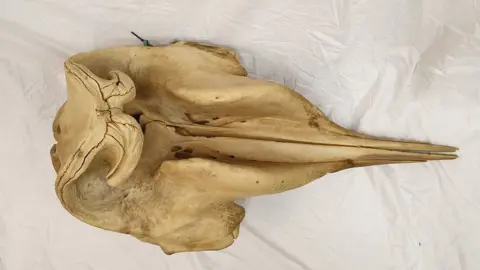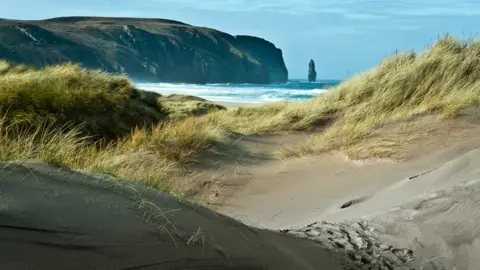Police in hunt for twice-lost rare whale skull
 Police Scotland
Police ScotlandPolice are investigating the illegal removal of a rare whale skull from a Highlands beach.
The 45kg (99lbs) skull of a northern bottlenose whale was taken from Sandwood Bay in Sutherland in August.
It was then found dumped on Cocklawburn Beach near Berwick-upon-Tweed, Northumberland, in October. But it went missing before it could be collected.
Police Scotland said it was illegal to possess any part of a whale, dolphin or porpoise without a licence.
The force, which is now appealing for information about the skull, said it been an illegal act removing the skull from Sandwood Bay, near Kinlochbervie.
The northern bottlenose whale, an elusive deep-diving species, had washed up at the Highlands beach in 2018.
Landscape charity the John Muir Trust, that owns the beach, had been monitoring the decomposition of the remains and planned to donate the skull to National Museums Scotland in Edinburgh.
The trust appealed for information after the skull, which is a metre long (3ft), was removed in August.
Police said it later turned up in Northumberland, but was lost between 19 and 22 October before it could be collected and taken back to Scotland.
 Getty Images
Getty ImagesDet Sgt Billy Telford, of Police Scotland's wildlife crime unit, said: "Whales, dolphin and porpoise are protected species in Scottish coastal areas, and this includes their remains.
"People may not be aware that it is illegal to remove their remains from beaches and other coastal areas."
He added: "This particular item had been earmarked for study. It is a rare example of this species in Scotland and therefore is of significant scientific interest to improve both our understanding of the species and its protection."
Don O'Driscoll, of the John Muir Trust said: "The trust is not happy with the way the whale skull was taken from its land at Sandwood Bay and subsequently lost.
"Exhibits like this are rare and provide an interesting insight into the anatomy of these specialised deep diving marine mammals."
Dr Andrew Kitchener, principal curator of vertebrates at National Museums Scotland, said it was important that the skull was returned.
